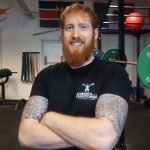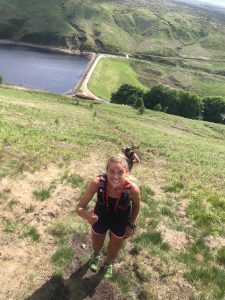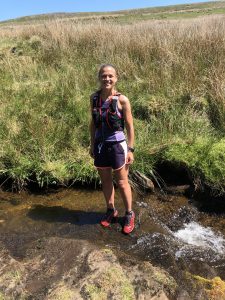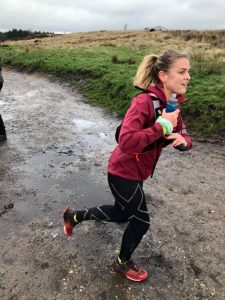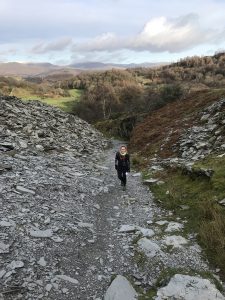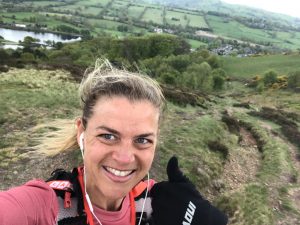INTRODUCTION
Hey, welcome to our ninth Meet the Expert blog.
In this blog, we interview expert coaches and athletes, delving into what makes them tick, what drives them to keep going, and what they believe to be the pitfalls and keys to success.
Let’s get to it!
Question 1: What is your name, age and where are you from?
My name is Rosie King-Smith (previously Campbell, I got married last August in the midst of the pandemic!), I’m 32, and I live in Cheshire, just south of Manchester and right on the edge of the Peak District.
Question 2: What is your occupation? Is it what you are known for or completely separate? What jobs have you done in the past?
I am a secondary school maths teacher. I’ve been a teacher for about 4 years now, prior to that, I was a trainee Actuary at KPMG. I am also a running and strength coach, an ambassador for the eating disorder charity BEAT, and the Education Lead on the Train Brave campaign.
In terms of athleticism, I am an ultra runner, favouring the 100-mile distance and looking to go further. The great thing about ultrarunning is there’s such a huge variety within the sport – from way-marked to completely self-navigated, flat and fast to hilly and technical, road to trail or mountain, and distances ranging from 50km to as long as you can imagine!
Personally, I prefer non-stop events, trail-based with a decent amount of ascent, but I do still enjoy getting out on the roads and working on my speed.
I compete at an amateur level, although professionalism within ultra running (particularly for females) is pretty difficult to come by. I have had podium success at numerous ultras and prefer to pick races with a competitive field, as ultimately, I aspire to be competing at a high level within the sport.
Question 3: What is your primary area of expertise and why are you passionate about it?
My primary area of expertise is in providing a holistic approach to training for endurance runners. I am qualified and experienced in both running and strength coaching, which means I can provide plans for runners that focus on all aspects of training and create sustainable athletes. I am passionate about enabling individuals to keep running for years to come and believe with the right approach there is no reason why this shouldn’t be the case.
I also have a high level of expertise in working with ultra runners in order to focus on non-running aspects of their training, from mental resilience to navigation and nutritional needs. I work closely with dietician Renee Mcgregor, who is a sports and eating disorders dietician, with experience working for the GB 24 hour squad and Olympic squads.
My final area of expertise and passion is working with pre and postnatal women, in order to empower them to continue to be able to pursue their own goals in a safe manner and return to the dignity of a fully functional body post-birth.
Question 4: How did you get started doing what you do?
Coach: In terms of coaching, I began to recognise my love of the role when working as a teacher – there is a huge amount of crossover in the two roles. At first, I began learning how to formulate training plans in order to self-coach, and found myself gaining more and more experience, and providing plans for friends and family. It seemed a natural progression at this point to formalise the role and begin to work with others outside of my immediate circle!
With regard to my beginnings as an athlete, I have run from a young age – as a child of four, we all ran and competed in cross country, track, biathlons and middle distance events throughout childhood, training with Sale Harriers. Like most youngsters, I stopped running in my late teens and didn’t pick it up again until my early twenties as a way to help cope with mental health difficulties. Running, and trail running in particular, became a form of mindfulness, a way to reframe perspective and get outside in nature, and a method by which to focus on what my body can do rather than what it looks like!
When I first started to move away from road running and into the trail and ultra world, I found that the skills I developed transferred into helping in other walks of life too. The need to problem solve, be adaptable, resilient, mentally tough, and be in it for the journey, not the finish line, are all valuable skills I’ve learned and ones that keep me going back for more. I find it empowering to be among the elements, testing myself and thriving, with only my wits and kit to help me. It teaches autonomy, which is particularly hard to come by in modern society!
Athlete: I’m not a full-time athlete – I currently juggle training up to 20 hours a week during peak phases with a full-time job as a secondary school maths teacher and my own business as a running and strength coach. I also have a little one on the way, which will add yet another element into the mix!
My motivation to train every day comes from the fact that I am truly passionate about running – I genuinely love to run and feel so much better for getting that down time on my own in nature. Like everyone, however, motivation can wane, and at times like these I find it important to remind myself that motivation is what gets you started, discipline is what keeps you going. I’m also an incredibly self-driven person, and enjoy having goals to work towards – I get satisfaction from progression within the sport.
Question 5: What are your weaknesses? What hurdles did you face and how did you overcome these barriers?
My biggest weakness is that I am fiercely independent, which means that in the past I have been reluctant to ask for help. As I have matured, I have learned the value in working with other members of a team, although I am certainly still careful about who I choose to partner with!
The biggest hurdle that I have faced was suffering for over a decade with severe clinical depression and an eating disorder. It took a long time for me to get the help that I needed, and the resilience and tenacity to be able to keep trying, in spite of everything, are skills I carry forwards to this day. My own struggles have also served to make me a more compassionate and forgiving individual.
Question 6: What are your biggest strengths, both as a coach and an individual? What do you believe to be the primary reasons for your success? What do you consider to be your biggest success so far?
I believe that one of my biggest strengths as an individual and as a coach is my ability to build strong relationships with a variety of individuals. I am empathetic and compassionate and understand that change isn’t always easy.
My other main strength is my thirst for learning and aptitude for acquiring new knowledge. I am continually undertaking CPD and looking to speak to other professionals who have knowledge in areas where I am lacking in order to develop my skill set as a coach.
As an athlete, I think that my biggest strengths are my drive and determination. I also consider my love of running to be a huge strength, as it means I genuinely enjoy getting out there every day and putting the work in. Over time I’ve learned to be more patient, which has become a further asset and to trust the process of consistency.
My final strength as an athlete is my ability to be honest with myself. Despite my drive, I won’t train when injured. I know how to ease off when I need to, and how to differentiate from days when my body really does need a rest and days when I’m just trying to find an excuse. As an endurance athlete, I feel that one of the strongest assets you can have is knowledge of your own body.
Question 7: Where do you think a lot of people go wrong and what general pieces of advice would you give to those looking to excel in areas similar to yours?
I think a lot of athletes neglect the unglamorous side of training which is consistency. The power of just showing up, putting the work in week after week, and knowing it takes time to build to a decent level no matter what the sport. Our society isn’t particularly conducive with being patient, and we’re constantly hearing stories of overnight successes – what we don’t see is the years of consistent work that have gone in before this!
I also think that a lot of athletes favour short-term wins over long-term gains – they’re so focussed on the next competition or race that they don’t think holistically about what might happen if they took a season off and focussed on some of their weaknesses.
Question 8: Are there any rules or quotes that you live by?
I have a few favourite quotes, I don’t necessarily live by them but I find quotes in general motivational. A few I particularly like are:
‘I am the master of my fate, I am the captain of my soul’ – Wiliam Ernest.
‘What if I fall? Oh, my darling, but what if you fly?!’ – Eric Hanson.
“It is not the critic who counts; not the man who points out how the strong man stumbles, or where the doer of deeds could have done them better. The credit belongs to the man who is actually in the arena, whose face is marred by dust and sweat and blood; who strives valiantly; who errs, who comes short again and again, because there is no effort without error and shortcoming; but who does actually strive to do the deeds; who knows great enthusiasms, the great devotions; who spends himself in a worthy cause; who at the best knows in the end the triumph of high achievement, and who at the worst, if he fails, at least fails while daring greatly, so that his place shall never be with those cold and timid souls who neither know victory nor defeat.” – Theodore Roosevelt.
The first is a reminder that ultimately we are in control of our own lives, our own successes, and our own failures. The second is a reminder that a fear of failure might prevent you from finding something wonderful, and the third echos the sentiment that trying, and possibly falling short, is far better than not trying at all.
Question 9: What are your plans for the near future? What goals do you currently have?
My current goals business-wise are to continue to build Run Wild and Free Coaching. Ultrarunning is an expanding sport, and if trained successfully, it is within the realms of possibility for most individuals. I am passionate about bringing the enjoyment factor back into running, about using it as a tool to experience and enjoy the world in which we live, and using it to equip individuals with skills that can be transferred from their running back into their everyday lives.
I truly believe that ultramarathons are a microcosm of life: we experience the highest of highs and the lowest of lows; we adapt, we overcome, we face discomfort, and yet we prevail.
My future plans as an athlete are slightly different, given that I’m currently pregnant and due to give birth in March! I was preparing for an FKT (fastest known time) attempt of the Peak District Boundary Walk when I found out I was pregnant, so I have some unfinished business there to attend to! (The PBW is a 190-mile circular route around the outskirts of the peaks, with over 24,900 ft of elevation). I’m also entered into the Arc of Attrition in February 2022, which is a 100-mile winter ultra along the South West Coastal Path.
Between now and then, my main focus is on running and training sustainably both during and after pregnancy in order to protect my body so that I can hopefully return to running again as soon as it is safe.
Question 10: Where do you see yourself in 5 Years? What is your ultimate goal?
I would love to be able to run my business full time, allowing me to pursue my passions of coaching and running while juggling commitments around a new family.
On a personal level, I’d love to keep making consistent improvements in my running and have taken on a few bigger events around the world. Some at the top of my list are the Laveredo Ultra Trail in the Dolomites in Italy, the Tours de Geants (a 205-mile race in Aosta Valley, Italy), the Spine Race, Lakeland 100 (which I was supposed to run last July, but was cancelled due to Covid), and UTMB. I’d also like to have tackled the three big rounds in the UK – the Bob Graham Round, the Charlie Ramsey Round, and the Paddy Buckley Round.
My ultimate goal is to gain sponsorship as an ultrarunner to be able to continue doing what I love at a competitive level.
CHECK OUT ROSIE’S CONTENT
Website: https://runwildandfreecoaching.wordpress.com
Instagram: https://instagram.com/rej_kingsmith
A WORD FROM THE AUTHOR
I loved reading these MTE answers, I find it fascinating when athletes decide to take on ultra distances over 100-miles, it is unbelievable!
I feel Rosie’s life experiences and her ultrarunning knowledge will make her an incredible coach, and I think she will develop a real niche where she will become the go-to expert.
I am really keen to watch her progress both as a coach and an athlete, and I’ll be very keen to help out when she gets back to running some of the monstrous races she has mentioned – I’d be in the support vehicle with a warm brew though!
If you are keen to feature in our Meet the Expert Blog and Newsletter, drop us an email to [email protected] and we will send you an intro pack.
Coach Curtis
